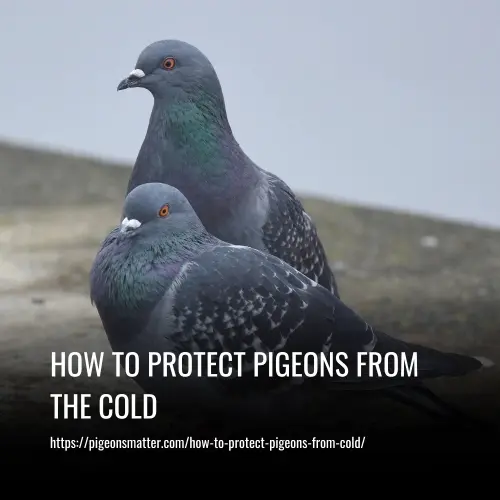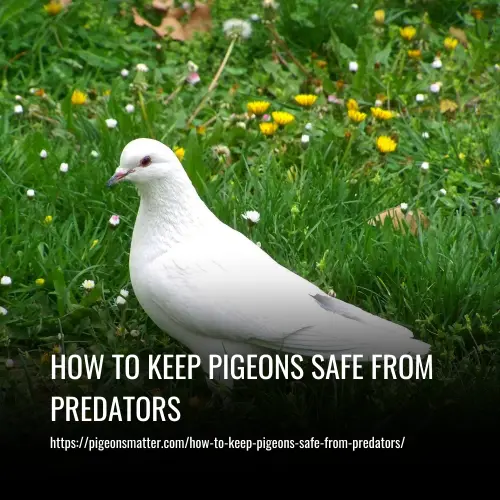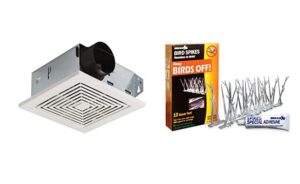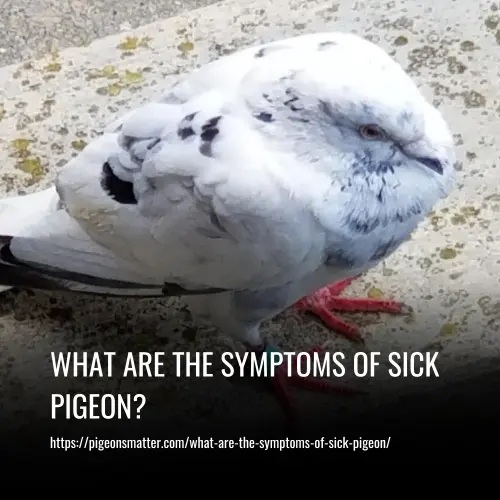Pigeons are hardy birds that can adapt to various environments, including cold temperatures. However, extreme cold weather can still pose a threat to their health and well-being.
To Protect Pigeons From The Cold, Follow These Steps:
- 1. Expose the Cage to Sunlight
- 2. Cover the Cage at Night
- 3. Turn On a Bulb in the Cage
- 4. Add Seeds to Pigeon Food
- 5. Provide Warm Water Bowls
- 6. Injury Prevention
- 7. Ensure Self-Sufficiency
- 8. Minimizing Disturbances
- 9. Creating Communal Roosting Spots

How to Protect Pigeons from the Cold
Taking care of your pigeons during the winter season is crucial to ensure their well-being and health. Here are some tips to help you keep your pigeons happy and comfortable during the cold weather:
1. Expose the Cage to Sunlight
Allowing the pigeon cage to be exposed to sunlight is important for their well-being and health. Pigeons enjoy sunbathing and spreading their wings in the sunlight. Make sure the cage is positioned where it can receive sunlight whenever it is available.
2. Cover the Cage at Night
To protect the pigeons from the cold during the night, cover the cage with plastic sheets or clothes. This helps to insulate the cage and keep the pigeons warm. It is a common practice among pigeon fanciers to provide this extra protection during the cold season.
3. Turn On a Bulb in the Cage
Providing an additional source of warmth and energy, turning on a bulb in the cage can be beneficial for pigeons during the cold weather. The light bulb generates heat, which helps to keep the pigeons warm. This is a common practice among pigeon fanciers and can be a fascinating sight to see.
4. Add Seeds to Pigeon Food
In the winter, it is important to include seeds such as linseed and sunflower seeds in the pigeon’s food. These seeds are high in energy and help pigeons fight the cold weather. Along with the usual ingredients of corn, wheat, and pearl millet, adding these seeds to the pigeon’s food provides necessary nourishment during the winter season.
5. Provide Warm Water Bowls
Place warm water bowls for pigeons and make sure to change the water frequently. Alternatively, you can also use heater mats under the bowls to prevent the water from freezing. Pigeons need access to fresh water, and providing it at a suitable temperature will aid in their overall well-being.
6. Injury Prevention
It is crucial to ensure that the pigeons are not injured in any way during the cold weather. Injuries can make it difficult for them to fend for themselves and survive in freezing temperatures. Regularly check the birds for any signs of injury and provide necessary care and treatment.
7. Ensure Self-Sufficiency
Pigeons are resilient birds, but they need to be in good health and condition to survive freezing temperatures. By keeping them well-fed, providing shelter from the cold, and ensuring they have access to fresh water, you can help them become self-sufficient and survive the winter months.
8. Minimizing Disturbances
Limiting human interference or disturbances in areas where pigeons roost or nest can help reduce stress and ensure their well-being. Avoiding unnecessary disturbances can help them conserve energy and maintain their natural behavioral adaptations for staying warm.
9. Creating Communal Roosting Spots
Pigeons naturally gather and roost together to share body heat. Providing areas or structures where pigeons can gather in flocks can help them stay warmer during cold nights. This can involve building roosting platforms or installing roosting poles.
By following these tips, you can ensure that your pigeons stay happy and healthy during the winter season. Taking care of their physical and emotional well-being is essential for their overall quality of life.
How To Tell When A Pigeon Is Feeling Cold
It’s important to recognize the signs of a cold pigeon to ensure their well-being.
1. Shivering
If you notice a pigeon shivering, it means they are trying to generate more body heat to keep warm. This behavior indicates that they are feeling cold and may need additional warmth.
2. Preening
Pigeons engage in preening to coat their feathers with body oils, which helps insulate their bodies and keep them warm. If you see a pigeon preening, it could be a sign that they are trying to stay warm.
3. Sunning
Pigeons may sunbathe to absorb direct sunlight and warm their bodies. If you see pigeons sunning themselves, it’s an indication that they are feeling cold and seeking warmth.
4. Tucking
Pigeons may tuck their legs or bill into their feathers when they are cold. This behavior helps them conserve body heat and prevent heat loss. If you observe a pigeon tucking in, they may be trying to stay warm.
5. Huddling
Pigeons often huddle together when they are cold. By huddling, they share body heat with each other and effectively combat the cold temperatures. If you see pigeons huddled together, it means they are seeking warmth from one another.
If you notice these signs in a pigeon, it’s important to provide appropriate measures to keep them warm and prevent them from becoming too cold.
Where Do Pigeons Go When It’s Cold
Pigeons, unlike many other bird species, do not migrate to warmer areas during the winter. Instead, they stay in very cold climates and find ways to keep warm. In the wild, pigeons will insulate their nests with leaves and mud to trap heat and stay warm during the winter. In urban areas, pigeons will seek out relatively warmer places such as attics or roof ventilators to build their nests.
They will also insulate their nests with whatever materials they can find to protect themselves from the cold. During the winter, pigeons tend to stay in their nests and do not venture out as much, which is why they may seem to disappear during this season.
What Happens When Pigeons Get Too Cold
When pigeons get too cold, they have a survival mechanism called torpor, where they go into a deep sleep-like state. In torpor, their bodies use very little energy and can survive even if their body temperature drops significantly.
However, pigeons in this state are very lethargic and vulnerable to predators because they cannot move quickly. It is important to keep pigeons warm and protected from extreme cold to prevent them from entering torpor.
How Do Pigeons Survive In The Winter
Here are some ways that pigeons adapt to fight the cold and ensure their well-being:
1. Minimizing Exposure: Pigeons tuck their head and feet, stick their feathers, and crouch to reduce their surface area exposed to the cold. They also gather in flocks to share warmth at night.
2. Using Feathers: Pigeons fluff out their feathers to create tiny pockets of air that provide insulation and keep them warm.
3. Building Calories: Pigeons eat more food in the fall to gain weight and build calories, which provide insulation and energy for producing body heat in the winter.
4. Minimizing Body Temperature and Metabolic Rate: Pigeons lower their overall body temperature and reduce their metabolic rate to conserve heat and energy in exceptionally cold temperatures.
5. Using Hyperthermia and Torpor: Pigeons position themselves in the sun to absorb its warmth during the day and roost together at night to share body heat. They may also use nocturnal hyperthermia or torpor to lower their body temperature and reduce their metabolic rate to conserve vital energy.
6. Eating a Lot: Pigeons eat extra food during the short days of winter to accumulate fat reserves that can sustain them through the cold nights.
7. Shivering: In extremely cold conditions, pigeons may shiver to increase heat production and stay warm.
Overall, pigeons have various adaptations to cope with the cold and ensure their well-being during the winter months.
FAQs
Pigeons are able to survive in cold weather. They are resilient birds that can withstand temperatures below freezing. While they may not prefer colder climates, they have adapted to living in different environments, including urban areas where cold weather and snow are common.
Pigeons feel cold because they are warm-blooded, just like humans. Unlike some animals that can change their body temperature to adapt to the weather, pigeons cannot do this. Additionally, pigeons do not migrate to warmer regions when it gets cold, so they continue living in the same places even when it snows. However, pigeons have adaptive features that help them tolerate extreme cold temperatures.
When pigeons are cold, they do not migrate like other birds. Instead, they stay close to their nests, which they are attached to. They show less activity to conserve body heat, whether they are in the wild or urban areas. In cities, they can be found in warm places like roof ventilators or attics. In the wild, they seek shelter in thick vegetation. Pigeons trap air pockets in their bodies and their feathers help keep them insulated and warm. They also huddle up together to provide additional warmth to each other.
Pigeons can tolerate cold temperatures and can survive in temperatures as low as -4 degrees Celsius. Unlike other birds and animals, pigeons do not migrate or hibernate during the winter months. They have a slower metabolism and are less active during this time. Pigeons mainly feed on seeds and scraps, so if you want to feed them during the cold season, you can offer them milo, millet, or corn in a flat feeder placed closer to the ground. Pigeons are not in any danger during the cold weather and can handle it well.
No, pigeons do not freeze to death when exposed to cold temperatures. Unlike many other birds, pigeons do not migrate or go into hibernation during seasonal changes. Instead, they stay where they are and are able to take care of themselves. Pigeons are relatively low maintenance and can tolerate the cold. They often huddle up together in clusters to keep warm, as they are social birds. So, there is no need to worry about pigeons freezing to death in cold weather.
Pigeons have several strategies to stay warm in cold weather. One way is by fluffing up their feathers, which helps to trap air and provide insulation. They also tuck their bills and feet to minimize heat loss. Preening is another method that pigeons use to combat the cold. By coating their feathers with oils, they make themselves somewhat waterproof and more efficient at retaining heat. Additionally, pigeons shiver in the cold to generate body heat. While this may not be noticeable from a distance, it is a common behavior among warm-blooded animals to keep warm in low temperatures.
Pigeons are able to withstand temperatures as low as -4 degrees Celsius. They are extremely adaptable and can be found in various environments, from cities to the wild. While they can survive in cold temperatures, they do not thrive in extreme heat, which is why they are not found in places like Saudi Arabia or the Sahara Desert. Pigeons are intelligent birds and have the ability to adapt and survive in diverse conditions.
Pigeons are able to thrive in cold weather due to their natural adaptations and by taking advantage of human activity. They are able to survive in any part of the world with little maintenance. Pigeons often live near humans because human activity provides them with a consistent food source and warmth. They may build their nests near humans and rely on them for food. Overall, pigeons are resilient birds that can adapt and thrive in almost any condition.
Yes, pigeons’ legs and feet can feel cold. While most pigeons have special scales covering their legs and feet that minimize heat loss, they still have limited nerves, blood vessels, and muscles in these areas. When pigeons start to feel the effects of the cold, they will tuck their feet by standing on one foot or squatting to cover both legs at the same time. This behavior indicates that they are uncomfortably cold.
Pigeons in cold weather will eat a variety of foods to survive. While their diet primarily consists of grains, seeds, and fruits, they are also known to eat insects and nuts. In winter, when food sources are scarce, pigeons rely on their keen eyesight and memory to find insects hidden in tree bark. They are adaptable and will eat whatever they can find to sustain themselves during the cold months.
No, pigeons do not migrate. They are able to survive the cold without the need to migrate. Pigeons are adaptable and can live in various environments. They rely on human food leftovers and people often feed them, ensuring they have enough food during the winter months. They also have good eyesight and memory, enabling them to find food sources such as insects even when they are scarce. Pigeons are able to produce crop milk to feed their young, eliminating the need for migration like other birds. Thus, pigeons are able to survive and thrive without migrating.
The body temperature of a pigeon is typically around 36.2 to 42.0 degrees Celsius (97.2 to 107.6 degrees Fahrenheit). Pigeons, like crows, are warm-blooded animals, which means they can regulate their body temperature. They have various strategies to generate and maintain their body heat, allowing them to tolerate freezing weather better than humans can.
Conclusion
In conclusion, protecting pigeons from the cold is important for their health and well-being. By providing food, shelter, and water sources, we can help these birds survive the harsh winter conditions. Additionally, creating a warm and safe environment, such as installing a heated birdbath or offering nesting materials, can further aid in their protection.
It’s crucial to be mindful of the cold and its effects on pigeons, especially in urban areas where they may have limited access to natural resources. Ultimately, taking these steps to protect pigeons from the cold can make a significant impact on their survival during the winter months.


